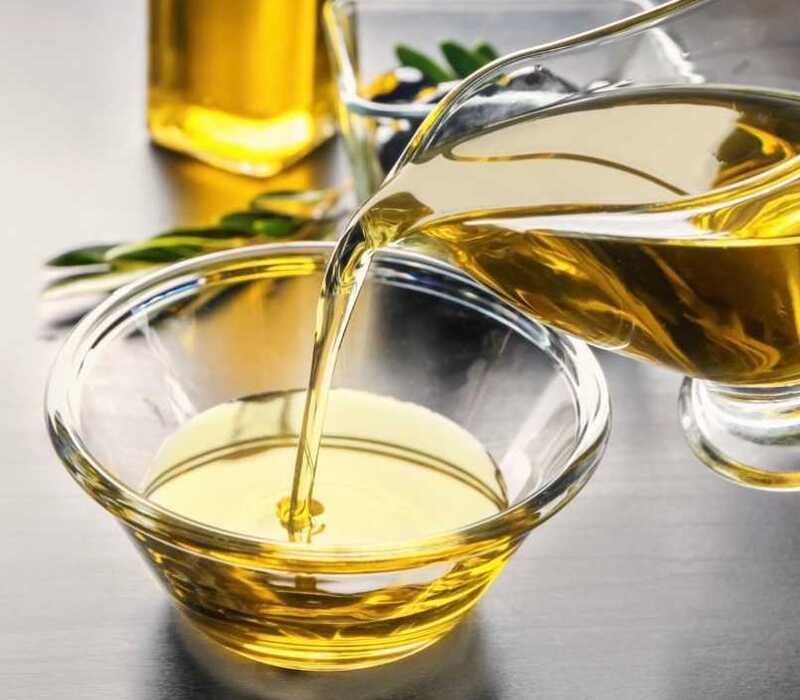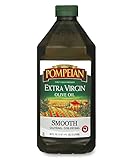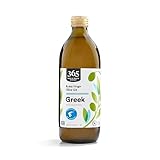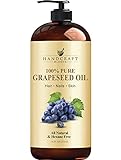Hi friends, today’s topic is interesting grapeseed oil vs olive oil. When it comes to healthy cooking, being thoughtful about your choice of oil has the potential to make a major impact.
The most common question you ask is, is grapeseed oil vs olive oil, which is better? This article will include a complete comparison of both oils including their nutrients side-by-side.
In addition, I’ll examine their tastes, whether one can substitute for the other, prices, smoke points, and health benefits. I’ll take a close look at which one is better for the most common goals.
Page Contents
Grapeseed Oil vs Olive Oil Differences
Olive oil is made by extracting oil from olives using heat and/or chemicals. Grapeseed oil is made by extracting the oil from grape seeds leftover from grapes used for winemaking. The finished olive oil is a blend of refined olive oil and extra virgin.
Grapeseed Oil
Made from pressed grape seeds leftover from grapes used for winemaking.
Has a mild, slightly grassy, and fruity flavor.
Cost less money.
Has a slightly lower smoke point.
Typically lighter in color with a hint of yellow to green.
It is made by the following method:
| The grape seeds are washed to remove unwanted products | |
| The seeds are then dried to remove excess water | |
| The grape seeds are then crushed or pressed to remove the oil from the seed | |
| It is filtered to remove some of the seed remaining | |
| Filtered a second time to make sure all the oil cakes are removed | |
| It is then bottled for shipping and sale to the market |
Olive Oil and Extra Virgin
Made from olives using heat and chemicals.
Has a mild, peppery flavor.
Cost more money.
Has a higher smoke point.
It is made by the following method:
| It is made by using the leftover paste from making extra virgin olive oil | |
| The leftover paste is heated and kneaded with chemicals to release more oil, water, and residue from the paste | |
| It is separated from the water and residue | |
| It’s filtered and bottled |
Grapeseed Oil vs Olive Oil Nutrition Facts

The nutrients in the table above may differ at times depending on the manufacturer. This may be due to the time of year, grapes used, olives used, when they were pressed, and other factors.
At first glance, it looks like they contain a similar set of nutrients. This may make some people wonder which one is healthier.
And the best part? Olive oil is healthier than grapeseed oil due to its higher percentage of vitamins, and minerals and it provides a better quality of fats. It contains more vitamin K, potassium, iron, and calcium. In addition, it contains 354% more heart-healthy monounsaturated fats.
Grapeseed oil is healthy also and contains a good number of vitamin E, healthy fats, and antioxidants. Although many of the fats are polyunsaturated, mainly omega-6. This makes its omega-3 to omega-6 ratio less than ideal.
I mostly use olive oils and avocado oil for their taste and nutrients. I use olive for low-temperature cooking, salads, dipping, and similar uses.
Let’s take a closer look at each macronutrient, vitamin, mineral, and fat closer.
Calories
They both contain 119 calories per tablespoon.
Vitamin K
Olive oil contains more vitamin K per tablespoon.
Vitamin E
Grapeseed oil contains 100.5% more vitamin E per tablespoon.
Potassium
Olive oil contains more potassium per tablespoon.
Iron
Olive oil contains more iron per tablespoon.
Calcium
Olive oil contains more calcium per tablespoon. I have also written an article on Common Olive Oil Substitution and How to Use it?
Know About What to Choose Grapeseed Oil vs Olive Oil Based on Your Goals?
Choosing one cooking oil may depend on your particular goal. Therefore, in this section, I examine the most common goals and determine which is the better choice for each one.
Weight Loss
Weight loss is something many people battles each year. If you’re looking to lose some weight, the number of calories may matter to you.
Therefore, let’s examine which is better for weight loss.
Olive and grapeseed oil are similar for weight loss because they contain the same number of calories per tablespoon.
Even though both are considered healthy additions to your diet, at 119 calories per tablespoon the calories can add up pretty fast.
It’s easy to add multiple tablespoons to a salad. Four tablespoons equal 476 calories added to the salad. Always be aware of the amount added and try not to overdo it. You can also get more from this video.
Bodybuilding
If you’re trying to gain lean muscle mass, the amount of protein and carbohydrates may make a difference. Let’s take a look at both and determine which is better for bodybuilding.
Grapeseed oil and olive oil are similar for bodybuilding because neither oil contains protein or carbohydrates. Both of them contain healthy fats and are a good addition to any bodybuilding diet. When bulking up, the calories may prove beneficial.
Gluten-Free
Avoiding any gluten is the main goal for people who wish to follow a gluten-free diet or have Celiac disease. Therefore, let’s examine which one is gluten-free.
Olive and grapeseed oil are both gluten-free and good for gluten-free diets. You can also read more about The Ultimate Showdown: Canola Oil vs Olive Oil – Which Wins in Taste and Nutrition?
Taste
Sometimes the nutrients and goals take a back seat to how something tastes. After all, if someone doesn’t like how food tastes, they will probably choose to leave it on the shelf.
Therefore, let’s examine how the taste of both compare.
Olive oil has a slightly stronger flavor than milder grapeseed oil. Grapeseed oil has a neutral, slightly fruity, or grassy taste, while olive oil has a hint of olives and is peppery. The virgin oils of both have more flavor than the refined versions.
I wanted to get the opinion of real people like you by conducting some original research. Therefore, I reached out to some readers, clients, and members of food groups. I asked, which one tastes better?
60% said they preferred the taste of olive oil.
37% said they preferred the taste of grapeseed oil.
3% said they had no preference.
To conduct more research, I set up and participated in my blind taste test. I tasted a teaspoon of each and chose the olive for its better taste. Another on Olive Oil and Lemon Juice Amazing Benefits.
Grapeseed Oil vs Olive Oil Substitutions
Have you ever wanted to try a new recipe at the last minute and found out you didn’t have the correct ingredient at home? Unable to go out to the store, you’ve probably wondered if you can use another one in its place.
Availability is one reason people will want to substitute one for the other in a recipe. Other reasons for doing this may include variety, taste, price, or smoke point.
This makes people wonder if they can substitute one for the other.
Grapeseed oil and olive oil can be used for each other in cold recipes. In hot recipes when cooking over 421°F, grapeseed oil can’t substitute for olive, but olive oil can substitute for grapeseed. When substituting the flavor will be slightly different in some recipes.
Olive oil substitutes for high-temperature cooking include the following:
- Refined avocado oil
- Safflower oil (refined and neutralized)
- Extra virgin avocado oil
- Pecan oil
- Sesame oil
- Corn oil
- Soybean oil
- Peanut oil
Grapeseed oil substitutes for high-temperature cooking include the following:
- Pecan oil
- Safflower oil refined
- Safflower oil neutralized
- Refined olive oil
- Palm oil
- Soybean oil
How to Add Grapeseed Oil vs Olive Oil to Your Diet?

Grapeseed Oil
Some people prefer using it because it doesn’t overpower the other flavors. Using it results in a different flavor and variety.
Use it when cooking in low to moderate temperatures.
- Dressings
- Add a tablespoon to a smoothie.
- Baking
- Sauteing
- Marinades
- Soups
Olive Oil
Use it for any cooking in temperatures up to 470 degrees.
- Frying
- Stir-frying
- Grilling
- Baking
- Dipping
- Salads
- Dressings
How to Store?
Good quality food can be costly, therefore, the shelf life you get out of each one is important. In addition, improper storage may lessen the taste and quality. Let’s examine how each one should be stored.
They both can be stored the same way.
Store grapeseed oil or olive oil in a cool, dark location away from light. It’s best to store them in a tinted glass container. Both should be kept at a temperature between 55-60℉, although they can be refrigerated or frozen if needed.
They should be stored in the refrigerator if the room temperature rises above 70℉. Leaving them in warmer temperatures affects shelf life and lessens their quality.
Unrefined or extra virgin can go bad quicker than refined. For this reason, many people store them in the refrigerator regardless of the room temperature.
Due to heat-creating appliances and heated ovens, kitchens tend to be a bit warmer than most other rooms of the house. Therefore, be sure to monitor your oil and the temperature of the room.
My kitchen is cool and away from sunlight. Therefore, I store mine in a cabinet away from the stove area.
Conclusion
I hope you enjoy my blog. What is now your opinion on which one is the better oil for you? Let me know in the comment section.
From high-heat sautéing to pan-searing to baking, grapeseed oil is a phenomenal ordinary oil; it’s particularly valuable in pasta sauces, soups, and dressings. Furthermore, you can involve it as a substitute for olive oil in cooking.
While grapeseed oil has more vitamin E than olive oil, it contains lower measures of the multitude of different nutrients or doesn’t contain them by any means.
Utilizing grapeseed oil can saturate dull, dried-out skin, even out your complexion, and lessen the presence of barely recognizable differences and kinks.












